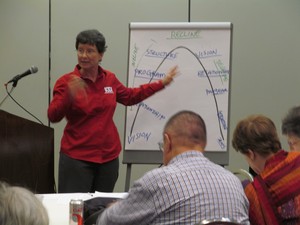Remember Sherriff Woody and Buzz Lightyear of Toy Story fame? Turns out they can teach existing congregations a thing or two about purpose, love, belonging, meaning and sacrifice.
“Just as they were marked by Andy’s (the boy who owned them) love, so we are marked by our baptism and God’s love,” said the Presbyterian Mission Agency’s the Rev. Ann Philbrick at Big Tent during an Evangelism and Church Growth plenary Saturday (Aug. 3).
During her presentation, Philbrick, associate for transformation, addressed the question, “What about existing congregations?” through the lens of the 1001 new worshiping communities (NWC) movement in the Presbyterian Church (U.S.A.).
“This is such an important question,” Philbrick said. “Without existing congregations, there can’t be any NWC. And yet NWC are the developing arm and experimentation lab for existing congregations.”
Philbrick pointed out that since the 1600s, there have been ebb and flow patterns for mainline denomination churches. During times of expansion, people figured out how to connect with the younger generation. During times of detraction, they lost touch.
“In the detraction cycle, at some point people figured out how to start new things to reach the younger generation,” Philbrick said. “The existing churches would watch, learn, listen and apply lessons — moving from detraction into a time of expansion.”
Since the 1960s, the ebb and flow cycle is deeper and longer than at any other time in history. Philbrick said radical culture shifts play into this but also pointed out that in the 1960s, congregations stopped starting new churches.
“We stopped learning the lessons new things can teach us, about what it means to connect, to reach beyond ourselves, to share our meaning of hope,” she said. “Our future rests on our ability to do more NWC.”
Which brings us back to Woody and Buzz in Toy Story 2. Woody is in a toy collector’s box about to go to a museum in Japan. Buzz comes to rescue him, but Woody is paralyzed with panic, fear and grief.
“Come on,” Buzz says.
“I’m not coming,” says Woody.
After some incredible moments of silence, Buzz says, “He’s not coming. Let’s go,” leaving him behind. But eventually Woody remembers that Andy (who is going off to college) loves him.
“This is the struggle for individuals and existing congregations,” Philbrick said. “Do I preserve what I have and stay forever what I am? Do we seal ourselves off, or love and give again sacrificially to people in the world?”
To presbyteries and congregations that don’t want to start new worshiping communities, Philbrick said we need to help them “not feel abandoned,” then say, “Come along. If you don’t, we’re going ahead without you.”
“It’s a scary time, but also exciting. We’re seeing stories, hearing things in our NWC that remind us who loves us, whom we belong to,” Philbrick said. “For the purpose of making friendships with non Christians to share our lives sacrificially with people we don’t know.”
Big Tent, Aug. 1-3, was a celebration of Presbyterian Church (U.S.A.) mission and ministry organized around the theme “Putting God’s First Things First.” It’s composed of 10 national Presbyterian conferences, more than 160 workshops and special events to mark the 30th anniversary of the formation of the PC(USA) and the 25th anniversary of the opening of the Presbyterian Center here.

